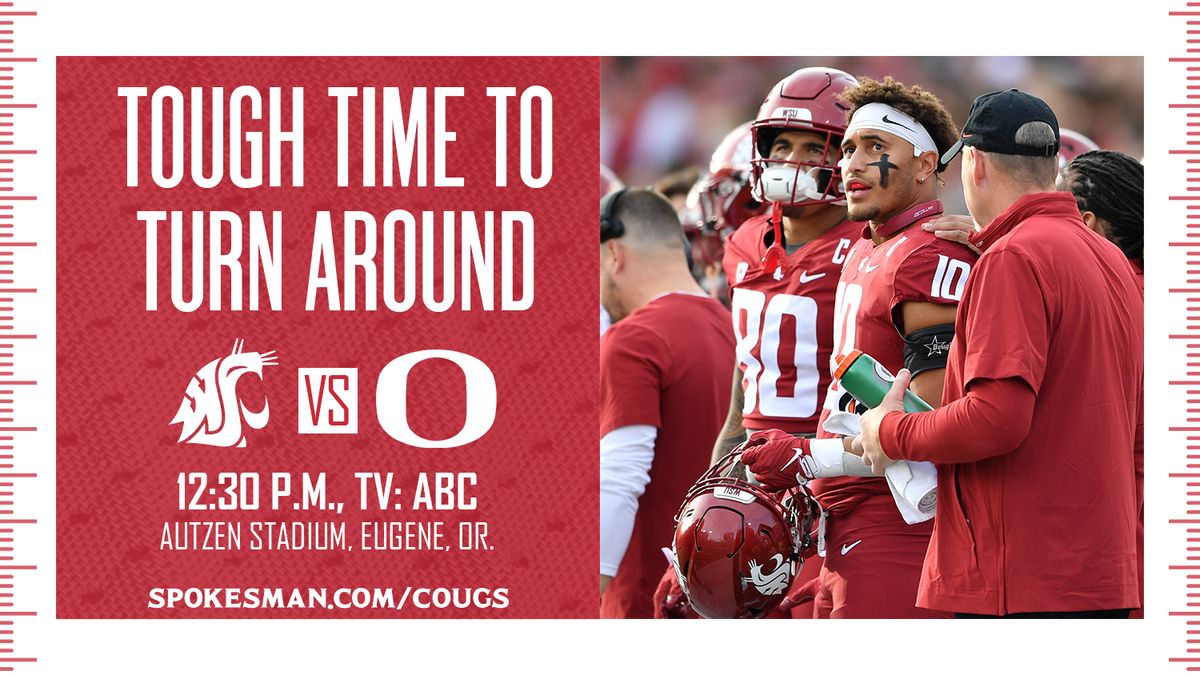Washington State gets monumental task in taking down No. 9 Oregon in Eugene

PULLMAN – Every once in a while, Jake Dickert tries to reel in a noise complaint or two from Washington State.
During weeks leading up to road games, particularly against opponents whose stadiums will be especially noisy, WSU practices at Gesa Field and cranks up the simulated crowd noise, blaring a cacophony that doesn’t just reverberate around the stadium. It bounces all around campus, where most everyone can hear it – students, faculty, administrators, the whole place.
“I think the students are like, ‘What’s happening?’ ” Dickert said. “But it’s good. It’s what’s needed. We wait till the last part of the day so it doesn’t wake anybody up.”
The noise may be the only thing Washington State can properly simulate about No. 9 Oregon. The Cougars will have to experience the rest for themselves on Saturday in Eugene.
WSU, fresh off back-to-back losses to unranked foes, faces a monumental task. The Ducks have a Heisman Trophy candidate, a power running back and strength along both lines. They’re headed to the Big Ten next year, but before they do, they have designs on flying to Las Vegas in December for the Pac-12 title game.
Washington State (4-2, 1-2 Pac-12) can derail that plan with a win. The question facing the Cougars is how.
Part of the answer might involve finding a way to beat Oregon’s defense, which will almost certainly roll out the scheme that has grounded WSU’s Air Raid offense in each of its past two games, a coverage-heavy scheme that rushes just three linemen. The Cougars have had no answers for that in each of their past two losses, and until they prove they can beat it, they’ll keep seeing it.
The way around that defense is to run the ball, but Washington State just hasn’t been able to. To Dickert, though, the drop-eight coverages have spawned a new problem for his team.
“What they’re doing is dropping and taking away the quick game, and that’s a big part of what we do,” Dickert said. “It allows kind of the protection maybe to break down a little bit more and get (quarterback) Cam (Ward) scrambling around. You gotta put someone on Cam. I think he’s electric in what he does. And they’re picking and choosing their spots to bring a ton of pressure.”
In Oregon (5-1, 2-1), Washington State faces a defense that allows just 16 points per game, good for 11th nationwide. The Ducks are coming off their first loss of the season, a 36-33 thriller against Washington in Seattle, but otherwise, they’ve looked ironclad. Edge rusher Brandon Dorlus has emerged as one of the best at his position, as has cornerback Khyree Jackson.
Oregon’s defense won’t just give WSU one of its taller tasks of the season. The Ducks will challenge the Cougars to run the ball, to run screen passes , to do anything to force them to play up at the line of scrimmage. Whether Washington State can deliver will have an outsize impact on the outcome.
“We just gotta be efficient,” Dickert said. “Whenever they do pressure, which they’ve been more aggressive this year, we gotta try to take advantage of it. It’s a rotating door there, and boy, they said they play about 15 guys.”
The revolving door Dickert mentioned is on Oregon’s defensive line. Dorlus may stand out most, but around him are linemen such as Jordan Burch, who has totaled 10 pressures this season. There are interior linemen Casey Rogers and Popo Aumavae, who have combined 11 quarterback hurries, and there are edges Matayo Uiagalelei and Blake Purchase, who have teamed up for 11 pressures.
Can WSU’s offensive line hold up? That may depend on who the Cougars roll out. Last week, when WSU sputtered to a 44-6 loss to Arizona, it switched things up, moving usual left guard Christian Hilborn to left tackle, bumping left tackle Esa Pole out – but only for the first half. He returned for the second half, moving right guard Ma’ake Fifita out for Brock Dieu.
So far, the Cougars have only been able to shuffle their personnel on the offensive line. Results have not followed. They remain Pro Football Focus’ worst run-blocking unit in the Pac-12, one of the lowest-graded in the country , and those struggles have flowed into every aspect of WSU’s team.
They’ve spilled onto the Cougars’ defense, which must defend Nix and star wideout Troy Franklin, who has bloomed into one of the country’s best receivers. He’s eclipsed 100 receiving yards in all but one game this season. He’s PFF’s No. 19 receiver in the country, and the third best in the Pac-12, averaging 7 yards after contact per reception.
Matching up with him will likely be WSU cornerback Chau Smith-Wade, who usually gets the opponent’s best receiver. At 5-foot-11, he’ll give up some size to the 6-3 Franklin, but that’s nothing new for Smith-Wade, who covered 6-5 Tetairoa McMillan during last week’s game against Arizona.
Can he slow Franklin? Maybe, but he and the rest of WSU’s secondary could use some help from its defensive line, which also gets an enormous task. Oregon’s offensive line is one of the sturdiest around. The Ducks’ front five owns PFF’s second-best pass-blocking grade in the FBS. That unit hasn’t allowed a sack this season.
There’s a reason why WSU is a 20-point underdog in most sportsbooks. To cover that spread and try to escape Autzen Stadium with a win, the Cougars will have to succeed in multiple ways. Good thing they feel ready for the noise.